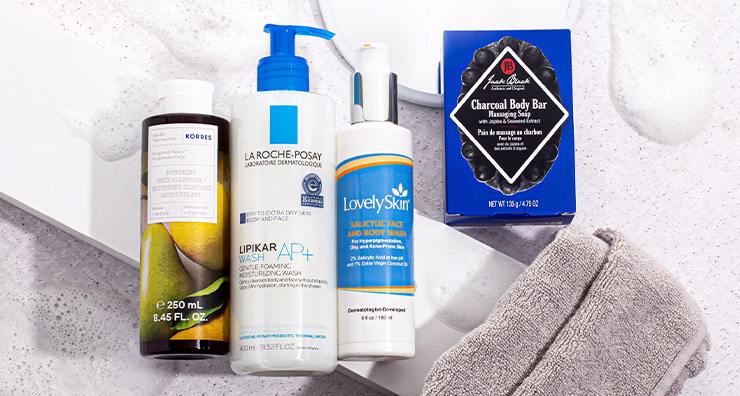
About the Author
Jill is a content writer for LovelySkin. She loves reading up on the latest beauty trends, going to concerts with her husband and baking with her three kids.
Other Posts by JillWelcome to LovelySkin.com.

If you’ve ever asked yourself, “Is shower gel body wash?” or wondered what the difference is between bar soap vs. body wash, body wash vs. soap and shower gel vs. body wash, read on. We’re sharing the differences between various body cleansers, why those disparities matter and which is best for your skin type. In this blog, the LovelySkin™ experts will cover:
There are numerous options when it comes to the choosing a body cleanser. Not only are body cleansers formulated with differing ingredients and scents, but similar to face cleansers, they also come in various textures like gel, foam, cream and even bar form. So, what’s the difference? And does it matter? We’re stacking body cleansers up against each other, head-to-head, to learn the difference between bar soap vs. body wash, body wash vs. soap and shower gel vs. body wash, plus which is best for your skin type.
The skin care savvy tends to invest most of their time (and money) into a regimen for their complexion. When it comes to body cleansers, any old soap will do, right? It turns out, that’s not entirely true. The differences matter when considering bar soap vs body wash, body wash vs. soap and shower gel vs. body wash, especially if you deal with skin conditions like eczema, psoriasis or body acne.
The debate between using a body wash vs. soap can often be misunderstood. Doesn’t body wash contain soap? Not usually. Traditional soap has a pH level of a 9 or 10, whereas the skin’s optimal pH lies somewhere around a 5-6, making actual soap a fairly harsh ingredient to use on skin. The good news is body washes aren’t typically formulated with true “soap” and instead use gentler synthetic surfactants like sodium lauryl sulfate, sodium laureth sulfate among others to suds up the skin.
The Jack Black Charcoal Body Bar Massaging Soap uses sodium palmate, a surfactant derived from palm oil to cleanse the skin without stripping moisture. It’s also infused with charcoal to detoxify skin and seaweed extract and glycerin to moisturize and soothe any irritation.
The CLn Body Wash uses sodium lauryl sulfate and sodium hypochlorite (also known as bleach) to purify skin prone to infections, eczema flare-ups and rashes.
Ever stepped out of the shower and noticed your skin was instantly itchy or even slightly irritated after it dried? If so, you’re probably using traditional bar soap. We asked board-certified dermatologist and LovelySkin CEO Dr. Joel Schlessinger to get the details on bar soap.
“Bar soap can be somewhat harsh on the skin, because the high alkaline nature of traditional soaps strip skin of moisture and throw off pH levels. However, advanced bar soap formulations are much more sophisticated and some, in fact, don’t even contain soap. I recommend choosing bar soap vs. body wash if you have very oily skin or if you live in a humid climate. It is also important to note that bar soaps should be rinsed thoroughly in between uses to avoid a build-up of bacteria.”
Body washes are more hydrating and moisturizing than bar soaps, making them ideal for normal to dry skin, winter months and drier climates. Body washes are usually creamy in consistency, cleanse with mild synthetic surfactants and hydrate skin with emollient ingredients like lipids, petrolatum and glycerin.
In terms of choosing a bar soap vs. body wash, both types of body cleansers can properly cleanse the skin. However, consider your skin type and any skin conditions you may have before lathering up with just any old formula. If you have seborrheic dermatitis or are dealing with an eczema or psoriasis flare-up, try the Noble Formula Bar Soap. This bar soap actually contains no soap at all and instead, uses ground oatmeal and 2% pyrithione zinc to safely and gently remove impurities on the skin, while relieving and preventing symptoms of skin conditions that cause dry, irritated skin.
If you have extra dry or sensitive skin, try the La Roche Posay Lipikar AP+ Face and Body Wash. Also a soap-free body cleanser, this gentle wash is fragrance-free and infused with glycerin, shea butter and La Roche-Posay Prebiotic Thermal Water to soothe dry, itchy skin.
If you’ve decided that the liquid version of body cleansers is best for your skin, you now have to choose between a shower gel and a body wash. You may have even asked yourself, “Is shower gel body wash?” Not exactly. While the differences between shower gel vs. body wash are few, they do exist. Body washes tend to be creamier in consistency, while shower gels are typically thinner in consistency and less hydrating. Those with oily or combination skin tend to see benefits from using shower gel vs. body wash, while those with drier or mature skin find a body wash works best for them.
Try the KORRES Renewing Body Cleanser in Bergamot Pear if you have normal to dry skin in need of light exfoliation. This moisturizing body wash uses lactic acid to gently slough away dead surface cells, aloe to soothe skin and invigorates the senses with a light botanical fragrance.
If you deal with oiliness and acne on the back and chest, use LovelySkin Salicylic Face and Body Wash. Formulated with 2% salicylic acid, this shower gel for acne penetrates deep into pores, unclogging them to treat and prevent breakouts. It’s a great multi-tasking option or for those on the go, as it can be used on the face and the body.
Do you have questions about choosing bar soap vs body wash, body wash vs soap or shower gel vs body wash? Ask the LovelySkin experts in the comments below!
Follow us on social networks and be one of the first to learn about sales, giveaways, and free samples
| Mon - Fri | 9 - 5 p.m. CT |
|---|---|
| Sat (chat only) | 9 - 3 p.m. CT |
| Sun / Holidays | Closed |
| Call or Text: | 402-697-1100 |
|---|